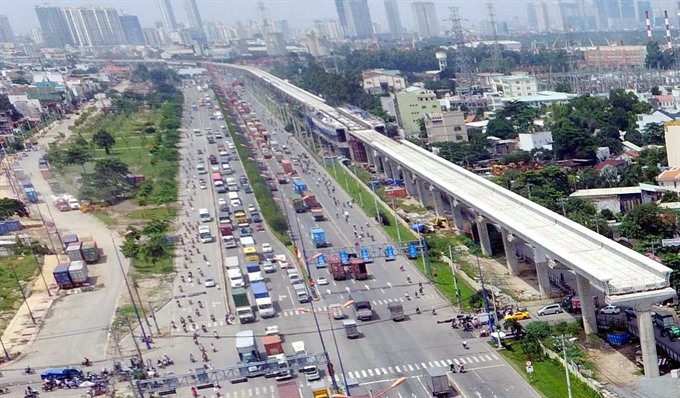 Society
Society

Progress on the metro continues, but a tax dispute has left some necessary equipment languishing at port, Lê Nguyễn Minh Quang, head of the HCM City Management Authority for Urban Railways told a press briefing on Friday
 |
| An elevated section of HCM City’s Bến Thành-Suối Tiên metro line runs along the Hà Nội Highway. — VNA/VNS Photo Mạnh Linh |
HCM CITY – Progress on the metro continues, but a tax dispute has left some necessary equipment languishing at port, Lê Nguyễn Minh Quang, head of the HCM City Management Authority for Urban Railways told a press briefing on Friday.
The elevated sections of the Bến Thành-Suối Tiên metro line from Ba Son terminal to Long Bình maintenance depot will install tracks next month, Quang said. Nearly 70 per cent of the metro’s elevated sections have been completed, according to Quang. He added that the installation of tracks would be carried out on the completed sections simultaneously with the building of the uncompleted ones.
Equipment used for metro track installation, however, is now “stuck” at port, he added.
He said that previously the Ministry of Finance had announced a zero per cent tax rate on imported equipment and goods used for the construction of the metro, but recently it has reconsidered this tax policy, so a new shipment of equipment remains in its port of entry.
“The HCM City People’s Committee has worked with the city’s Customs Department and the General Department of Customs to find a solution to the problem so that the construction schedule will stay on track,” he said.
According to Dương Hữu Hòa, director of the Metro Line 1 project, Japanese contractors are working on the train for the city’s first metro line and will send it to Việt Nam by October next year for early testing.
He said he has sought the opinions of foreign experts on the construction of the Điện Biên Phủ flyover, one of the five of its kind on the metro route, to minimize the impact on traffic.
The other four overpasses are being built above the Hà Nội Highway, the Sài Gòn River, the Rạch Chiếc Canal and Văn Thánh Canal.
Funding shortage
Regarding the shortage of ODA capital for the metro, Quang said last month that the city had to withdraw VNĐ500 billion (US$22 million) from its budget to pay debts to contractors, but that this could not be considered a long-term solution.
“This is just a temporary solution as in reality the city needs VNĐ500 billion-VNĐ600 billion a month to pay the contractors,” he said.
The city is looking forward to receiving ODA capital from the central budget in the medium term from 2016 to 2020 to pay for consulting companies and contractors this year, he said.
The Bến Thành-Suối Tiên metro, on which construction began in August 2012, is valued at $2.49 billion.
The nearly 20-km metro, connecting HCM City’s District 1 and Bình Dương Province’s Di An District, is expected to be operational in 2020.—VNS




